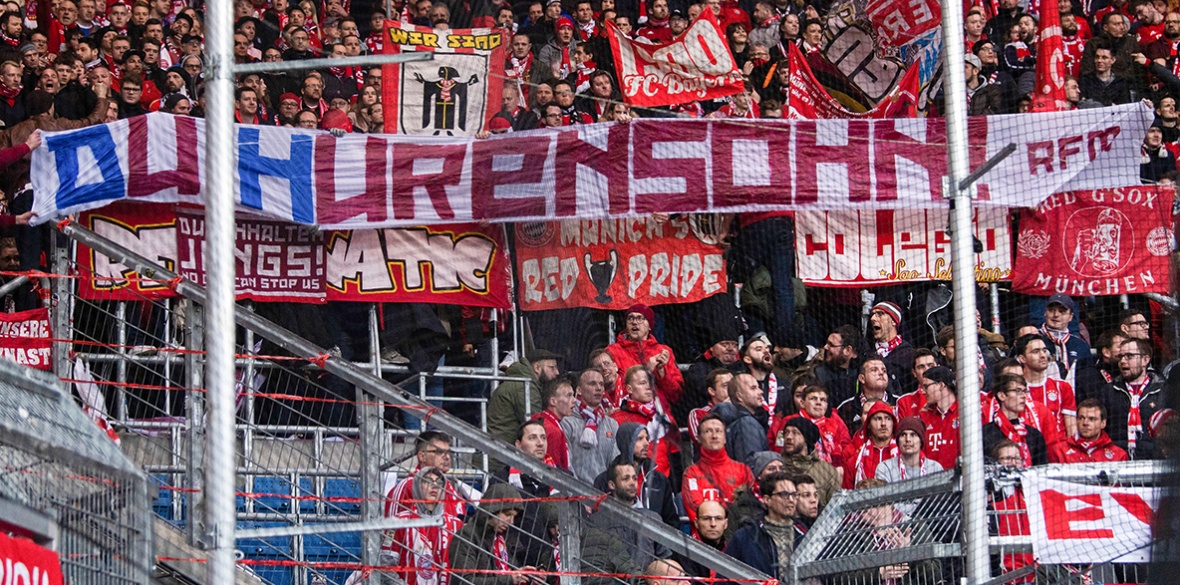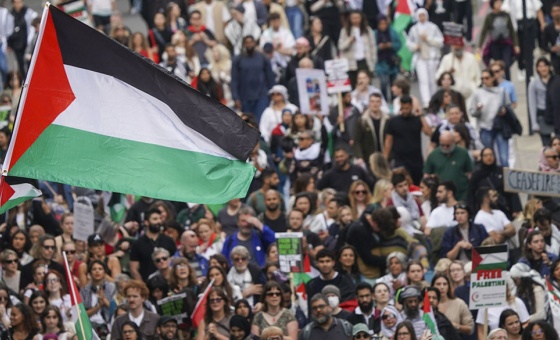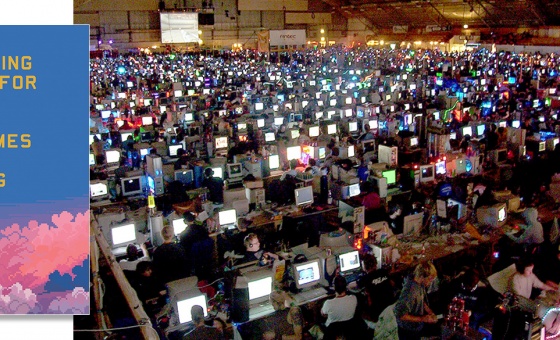This is the last article you can read this month
You can read more article this month
You can read more articles this month
Sorry your limit is up for this month
Reset on:
Please help support the Morning Star by subscribing here
PASSIONATE and controversial protests have been a feature across German football in recent weeks as supporters’ groups join together to fight for the values that define the character and fabric of football in the country.
Banners have been unfurled in support of Borussia Dortmund fans who were banned by the DFB (German FA) from travelling to games against fellow Bundesliga side Hoffenheim for two seasons, following their protests against Hoffenheim’s billionaire owner Dietmar Hopp.
The ban is an activation of a suspended sentence from 2018 when Dortmund fans protested against Hopp in a manner viewed as threatening and insulting to the Hoffenheim owner.
And it is that word “owner” that fans across Germany take exception to. The background to this issue relates to the 50+1 rule which ensures German football clubs are majority-owned by its fans or members.
An outside investor can only buy a maximum 49 per cent of shares in a club, meaning supporters always have that extra control and ongoing link to their team.
But Hopp owns 96 per cent of the shares in Hoffenheim, who were just a village team playing in local amateur leagues when he took over in 2000, hence the ease with which he worked around the 50+1 rule.
He has used his wealth to transform the club, and in less than 20 years has taken them from amateur leagues to a third-place finish in the Bundesliga and the Champions League group stages.
Hopp’s sidestepping of German football’s traditional ownership rules has meant support for those Dortmund fans has come from across the country.
It has taken many different guises and led to a chain reaction around the league where supporters’ groups have hit back against the initial reaction to the protests.
It began at the game between Borussia Monchengladbach and Hoffenheim two weeks ago, where a particularly offensive, hard-hitting banner showed Hopp’s image in crosshairs.
A high-profile flashpoint followed during Bayern Munich’s trip to Hoffenheim last weekend.
The game, being shown on TV around the world to Bayern’s global following, was stopped when the away fans held up a banner, similar to that which the Dortmund fans had been banned for, insulting Hopp, prompting players and club officials, including Hopp himself, to approach the Bayern end, encouraging them to cease their actions and words.
Bayern players and officials stood with Hopp, while the fans stood against him, and neither backed down.
With Bayern already 6-0 up, the match was eventually seen out to 90 minutes, but for the remainder of the game players of both teams passed the ball between each other in their own mini-protest against the fans.
The three-step protocol which football’s governing bodies have for dealing with racism from the stands now appears to be being applied more stringently to criticism of rich owners.
Comparisons have been made between the extreme reaction to protests against Hopp, which has led to referees applying the protocol immediately and players encouraging their fans to stop, and incidents of racism across European football which have not been subject to the same stoppages from the referee, and very often leave the abused player no choice but to take matters into their own hands.
Granted, some of the messages aimed at Hopp were personal and insulting, but the supporters’ groups will say that was the point of them. Their voices would not be heard otherwise.
“It was clear to us that our banner for the game against Hoffenheim would attract media attention, and was therefore knowingly chosen,” said a statement from Bayern supporters’ group, Red Fanatic Munchen.
“The choice of words was not our usual style, but a clear reference to the sanctioned banners from the Dortmund supporters.”
These are not necessarily protests against Hopp personally. He is merely a symbol of what the supporters see as a threat to the spirit in which the game is not only played, but run in the country.
As discussed in the recent column covering German non-league side HFC Falke, who broke away from Hamburger SV once the club sold some of their shares to an outside investor, supporters are doing their utmost to retain a link to their clubs in an increasingly commercial sport.
The 50+1 rule isn’t enough for those fans who broke away from Hamburg to form HFC Falke, as they believe that a football club should be run by the fans, for the fans. 100 minus zero, as many call it.
But the 50+1 rule is sacred at clubs where supporters are at least majority shareholders, even if they don’t own their club outright.
There are exceptions to the rule in the shape of traditional factory teams Bayer Leverkusen and Wolfsburg who remain owned by manufacturers, Bayer and Volkswagen respectively, but clubs such as Hoffenheim and RB Leipzig have worked their way around the 50+1 rule in a different way.
English football followers may recognise Hoffenheim as the former team of the likes of Liverpool’s Roberto Firmino and Newcastle’s Joelinton but in Germany, it is a symbol of something else.
The criticism of the recent protests, and the reactions of players and governing bodies to them, has led to separate demonstrations. It has seen fans hit back at those supporting the suppression of the original protests, not all of which could be viewed as threatening or insulting.
The big story on the pitch in Germany this week was the progress of 1 FC Saarbrucken in the DFB Pokal (German FA Cup).
The team play their football in one of the country’s regional leagues, as Hoffenheim once did, and became the first fourth-tier side to reach the semi-finals of the cup after defeating Fortuna Dusseldorf on penalties.
The game was played in the nearby town of Volklingen due to the rebuilding of the Saarbrucken’s Ludwigsparkstadion, which was once home to the Saarland national team during the Saar Protectorate years which followed World War II.
Even the Saarbrucken fans, on the verge of one of the biggest moments in the club’s history, took the opportunity to add their own voice of solidarity with those Bayern supporters, by attacking Bayern’s relationship with Qatar airways.
“Countless dead in Qatar yet Bayern is still there,” said the banner held high by the Saarbrucken supporters.
Many fans would see this as an attack on their club, but not Bayern supporters. They have been vocal in their discontent at their own club’s relationship with a country that has a terrible reputation when it comes to workers’ rights.
“What is going on in Qatar and the nations around Qatar is well known, but we write their name on our sleeves,” Bayern club member Johannes Bachmayr said at the club’s AGM in 2018.
“On the one hand side we attack Paris Saint-Germain viciously, as a state-sponsored team from Qatar, but we do like to receive the sponsorship money from Qatar.”
The protests are likely to continue for the foreseeable future, and the lack of support, or at least understanding, from players to fans on this issue has been disheartening.
Bayern goalkeeper Manuel Neuer commented: “People who do something like that at a stadium aren’t football fans,” his words revealing that players might not understand the wider aims of these protests, and see it solely as an attack on Hopp.
In a league where fans are renowned for being socially and politically aware, especially when it comes to retaining at least some of their clubs’ core community values, a solution will only come when authorities and players work with supporters rather than against them.









